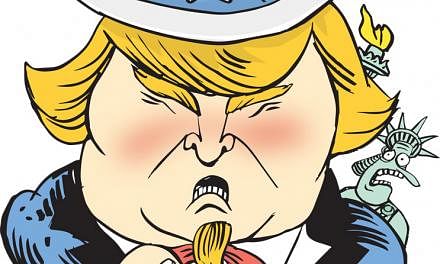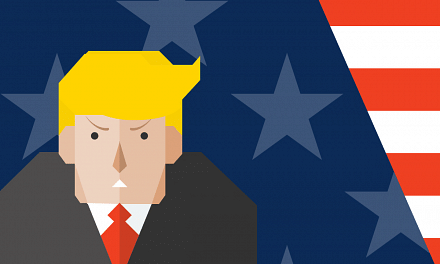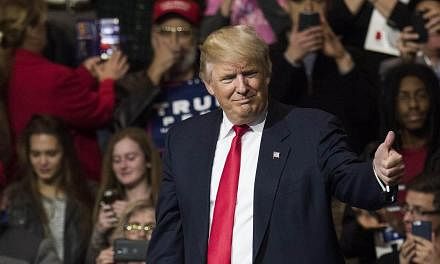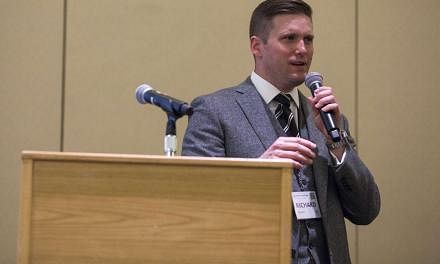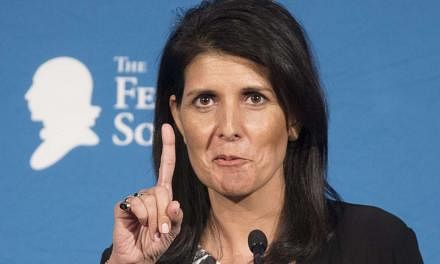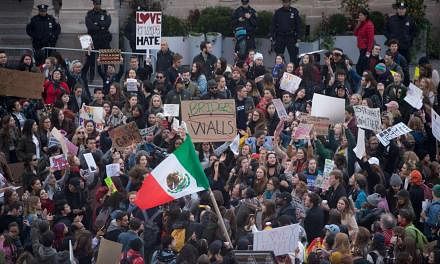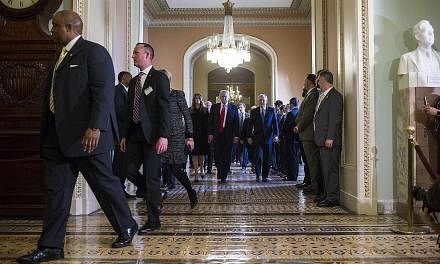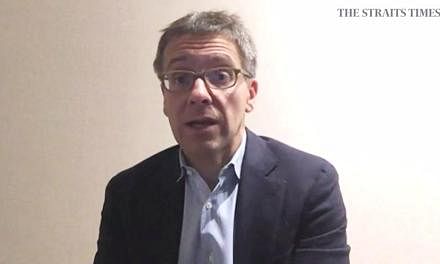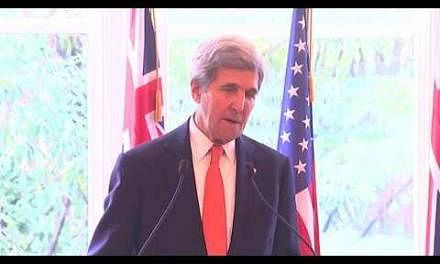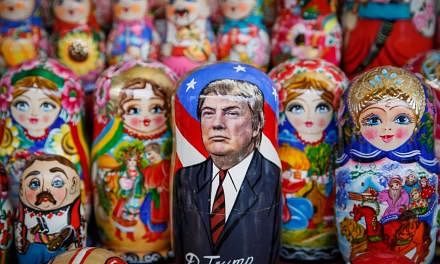WASHINGTON (WASHINGTON POST) - As voters flooded polling places across the country on Election Day, some reported problems such as broken machines, long lines and voter intimidation in states ranging from Texas to Pennsylvania.
While voting appeared to proceed without headaches in many locations, election observers said they expect a significant increase in the number of issues reported nationwide. In particular, voters in jurisdictions across the country encountered problems with malfunctioning voting machines, highlighting issues with the ageing infrastructure expected to support tens of millions of voters turning out on Election Day.
The first high-profile legal action of the day saw Mr Donald Trump's campaign headed to court for a hearing in Nevada after filing a lawsuit arguing that polls were improperly kept open late during early voting in Clark County.
According to the lawsuit filed by the Republican nominee, this was done "to help Hillary Clinton", Mr Trump's Democratic opponent. Mr Trump's campaign asked for the voting machines and ballots involved "be set aside, sequestered and impounded" to preserve the status quo "in the event of post-election challenges".
A spokesman for Clark County noted that early voting records already have to be preserved under state law and said that no polling precincts were improperly kept open. At a hearing on Tuesday morning, a sceptical judge questioned the Trump campaign's attorney and denied the request to preserve evidence in the case.
This lawsuit follows a raft of recent legal wrangling in the days leading up to the election.
As the bitter presidential campaign rumbled towards its conclusion, officials across the country have been bracing for the possibility of confusion and chaos on Election Day, owing to a flurry of new voting restrictions and Mr Trump's calls for his supporters to closely monitor polling places.
Voters in Florida, a key battleground, reported multiple accounts of voters saying they have encountered aggressive, intimidating behaviour, according to a non-partisan group monitoring election issues nationwide.
"In Florida we continue to receive a substantial amount of complaints about voter intimidation," said Ms Kristen Clarke, president of the Lawyers' Committee for Civil Rights Under Law, which is running an independent effort to field voter complaints and questions.
Ms Clarke said her group received reports from Miami-Dade County of "yelling, people using megaphones aggressively".
In Jacksonville, in the north-east corner of the state, Ms Clarke said: "An unauthorised individual was found inside (a) polling place." This person was at St Paul's Methodist Church, a polling precinct in what Ms Clarke described as a part of Jacksonville with predominantly black residents.
"He was asked to leave and refused," she said. "Through our intervention and calls, that individual has been removed. Unauthorised individuals have no place in the polls."
During early voting, Ms Clarke's group also received reports from Hollywood, Florida, about "aggressive individuals hovering around individuals as they approach the polling site", she said during a briefing with reporters.
"Some have turned away because they did not feel able to freely cast (a) ballot."
Ms Clarke said her group has received reports from about 80,000 voters since the beginning of early voting and expects that figure to reach 175,000 reports by the time the polls close. In 2012, the group received 90,000 calls total on Election Day.
On Tuesday afternoon, Colorado officials reported what could have been one of the biggest disruptions of the day. A spokesman for the Secretary of State's office said that voter registration system was down in parts of the state, which meant that clerks could not process mail ballots and also meant that in-person votes would be viewed as provisional. The issue was resolved shortly before 3.30pm Denver time.
During a telephone interview on Tuesday on Fox News, Mr Trump did not say whether he was expecting to argue with the outcome of the election, but he said he believed there were reports of voter fraud happening across the country.
"It's happening at various places today, it's been reported," he said. "The machines, you put down a Republican and it registers as a Democrat, and they've had a lot of complaints about that today."
It was not immediately clear what accounts Mr Trump was referring to when he mentioned "a lot of complaints" about the issue.
A report out of Clinton Township, an area near Pittsburgh, quoted some voters saying their tickets were switching from Mr Trump to Mrs Clinton. According to that report, officials there said the machines were fixed and the problem resolved.
There have been other issues with machines, including some cases of them showing incorrect votes, though it was unclear how widespread this was.
Ms Wendy Weiser, director of the Democracy Program at the Brennan Center for Justice at New York University School of Law, said that they are seeing more problems with voting machines than they have seen in past election years."There are more machine breakdowns and more malfunctions all over the place," Ms Weiser said. "It's really widespread."
These breakdowns are not a surprise, Weiser said, because 42 states are using machines that are 10 or more years old. There have been issues with machines in South Carolina, New York, Missouri, Georgia, Virginia, Pennsylvania, Kentucky, Connecticut, Massachusetts, Illinois and Indiana."These machines are just degrading," Weiser said.
The problem with voting machines has long been predicted by voting experts. In a report last year, the Brennan Center found that in 14 states, voting machines set to be used in the election will be 15 or more years old.
The centre said that the machines were "perilously close to the end of most systems' expected lifespans", noting that nearly every state is using some machines that are no longer manufactured, making it hard to find replacement parts.
"Old voting equipment increases the risk of failures and crashes - which can lead to long lines and lost votes on Election Day," according to the 2015 report.
Although voting machines in use across the country debuted around 2000, they were actually designed and engineered in the 1990s, the report said, and "today's systems were not designed to last for decades".
One specific problem highlighted by the report and mentioned on Tuesday by Ms Weiser was "vote flipping", which is what Mr Trump seemed to be referencing. This occurs when a voter presses a button on a touch screen for one person but the machine shows them voting for another candidate.
"We've seen more malfunctions and more vote flipping all over the place," Ms Weiser said. But it was not clear how many machines were seeing vote flipping.
Mr Mark Thomas, director of elections in Utah, said that on Tuesday morning, local officials in Washington County found that none of their voting machines were working. They wound up using paper ballots as a backup; the issue with fixing the machines was finished by noon, he said.
Issues with machines caused lines earlier on Tuesday at precincts in Virginia, Ms Clarke's group said. Her group also heard similar complaints from Philadelphia, one of the cities specifically cited by Mr Trump during speeches in which he claimed that voter fraud is "all too common" and asked his supporters to closely monitor other voters.
The office of Philadelphia District Attorney R. Seth Williams said it has assembled a task force including more than 70 prosecutors and dozens of detectives to tackle complaints of voter fraud, intimidation and electioneering.
"We, as expected, had kind of a busy call volume in the morning," Mr Cameron L. Kline, a spokesman for Mr Williams, said on Tuesday morning in a telephone interview. Mr Kline said the task force was not seeing an unusual volume of calls or complaints.
"So far the trend is historically rolling the right way."
The Philadelphia Republican Party posted on Twitter that poll workers in the northern part of the city were handing out literature supporting Mrs Hillary Clinton, the Democratic nominee, while inside a polling station.
Problems with machines also cropped up in North Carolina, another major battleground state and home to one of the country's most high-profile laws imposing new voting restrictions.
In Durham County, North Carolina, which has more than a quarter-million residents outside Raleigh, officials ran into technical problems with the electronic poll books used to check in voters.
As a result, state authorities told Durham officials to use paper poll books, rather than electronic ones, eventually leading to some delays. (Durham was already using paper ballots.)
The issues in Durham prompted officials there to ask for voting to be extended in that county. In a statement, the North Carolina State Board of Elections said that it would meet later on Tuesday to consider that request. In a statement, Robby Mook, Mrs Clinton's campaign manager, urged the state to agree to push back voting hours.
A group filed a lawsuit on Tuesday afternoon seeking to keep the Durham polls open until 9pm.
There were also other problems reported across the country. In complaints submitted to The Washington Post, voters described confusion over identification requirements in Pennsylvania, Texas and Washington D.C., among other issues.
Volunteers with Common Cause, a non-partisan government reform group, fanned out to help at the polls on Tuesday, and they also saw problems with relocated polling places, broken machines and confusion from voters and poll workers alike over new voter ID laws.
In Harris County, Texas, the county's website listed the incorrect polling places for a number of precincts, according to Common Cause. A lot of voters went to one site only to be told that the voting place had been changed. And in one precinct, voters were sent to a third site."Voters had to go to a lot of trouble to cast a ballot," said a Common Cause worker in Texas. Also in Texas, there were a "large number of calls" about voting machines that were not up and working when the polling places were supposed to open.
Ohio has mostly been dealing with routine problems, including a power outage. But in one county, Montgomery, there was confusion over the number of pages that were supposed to be on the ballot. Only one page was provided. The poll workers had to call all the voters to return and correct their ballots with the second page.
Ms Clarke said the lawyers' committee was contacted about sites that did not open on time in Brooklyn and Boston, along with long lines and broken machines elsewhere.
In Georgia, Ms Clarke said, people complained of "11th-hour polling place changes with no notice issued to voters", creating uncertainty over where to go.
Leading up to Election Day, there have been some heated confrontations between supporters of Mrs Clinton and Mr Trump. The specter of possible violence has loomed over Election Day after a particularly vitriolic campaign, one in which issues of race, class, gender and ethnicity have taken centre stage in caustic ways.
In a poll last month, half of likely voters said they were worried about violence on Election Day. Meanwhile, US officials recently said they were investigating a possible threat from Al-Qaeda to carry out pre-election terrorist attacks, although the authorities described the threat as vague and said they were unclear whether it was credible.
Law enforcement officials from Nevada to Georgia have pledged an increase in officers at some locations, with agencies vowing vigilance and saying they are prepared for possible issues.
The Las Vegas police said units would visit polling locations, though the department noted that early voting in Clark County came and went without any issues of violence at the polls. In Chicago, another city named by Mr Trump when he exhorted his supporters to monitor polling locations, police say it is normal procedure for them to have extra officers visiting these sites to ensure safety.
Police in New York are preparing for "a very unique set of challenges," because both Mrs Clinton and Mr Trump plan to hold election-night events in Manhattan, said Mr James O'Neill, the police commissioner.
But Mr O'Neill said police are prepared to secure more than 1,000 polling locations across the city, as well as the Clinton and Trump events just two miles apart later on Tuesday night."Planning for security events like this is a big part of what we do," Mr O'Neill said during a briefing on Monday. "This is nothing new to us."

